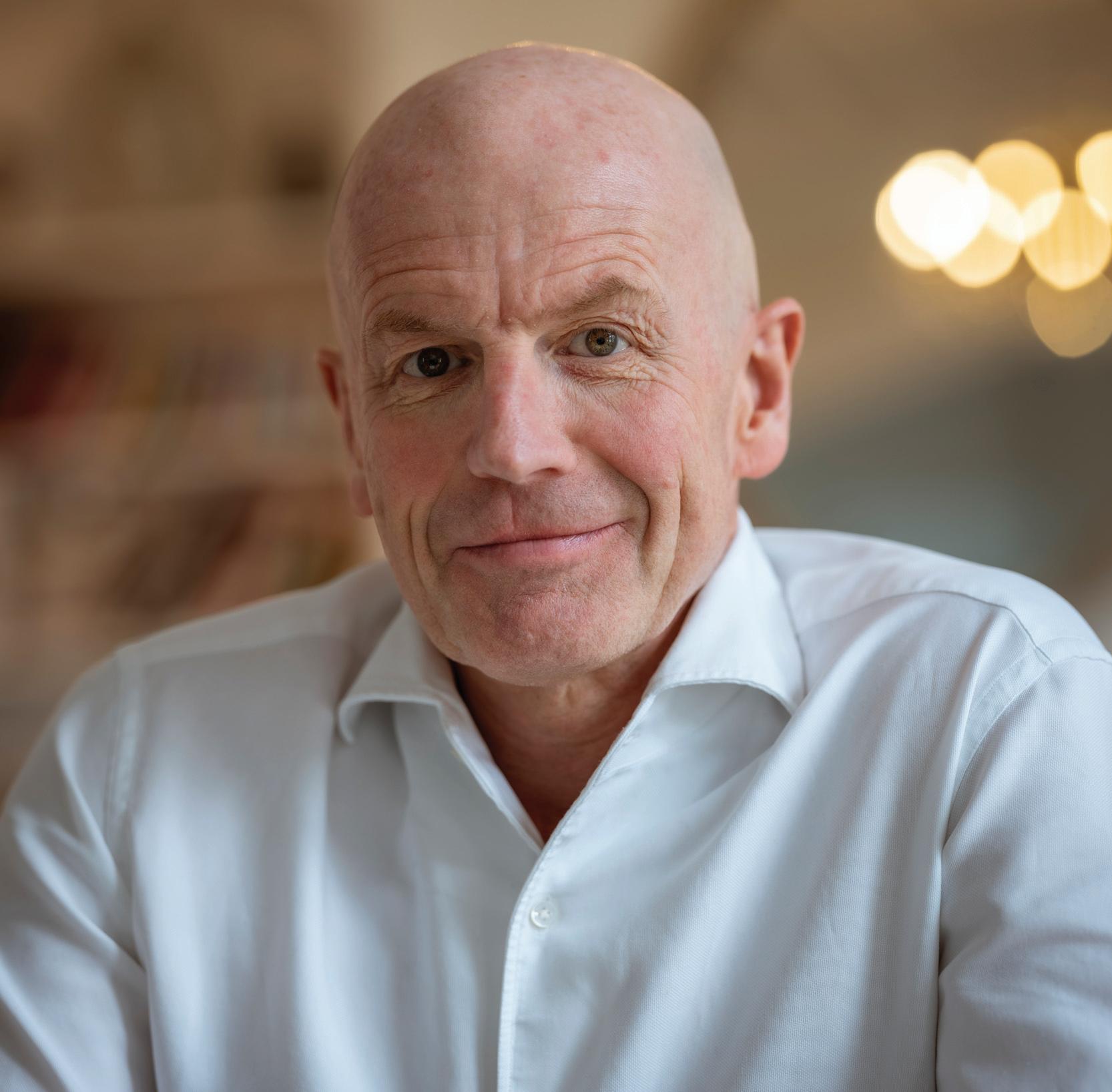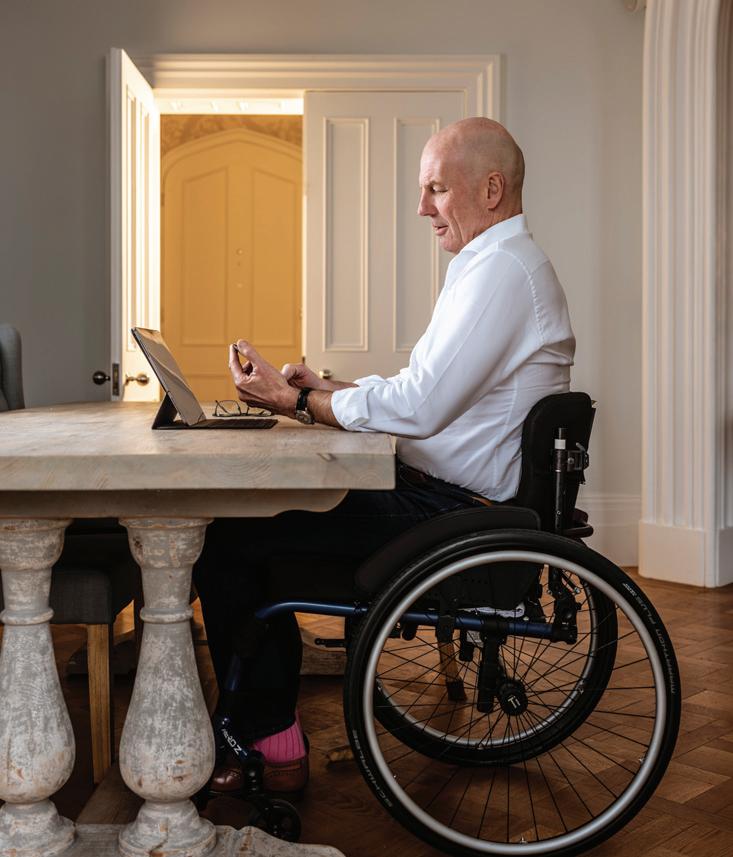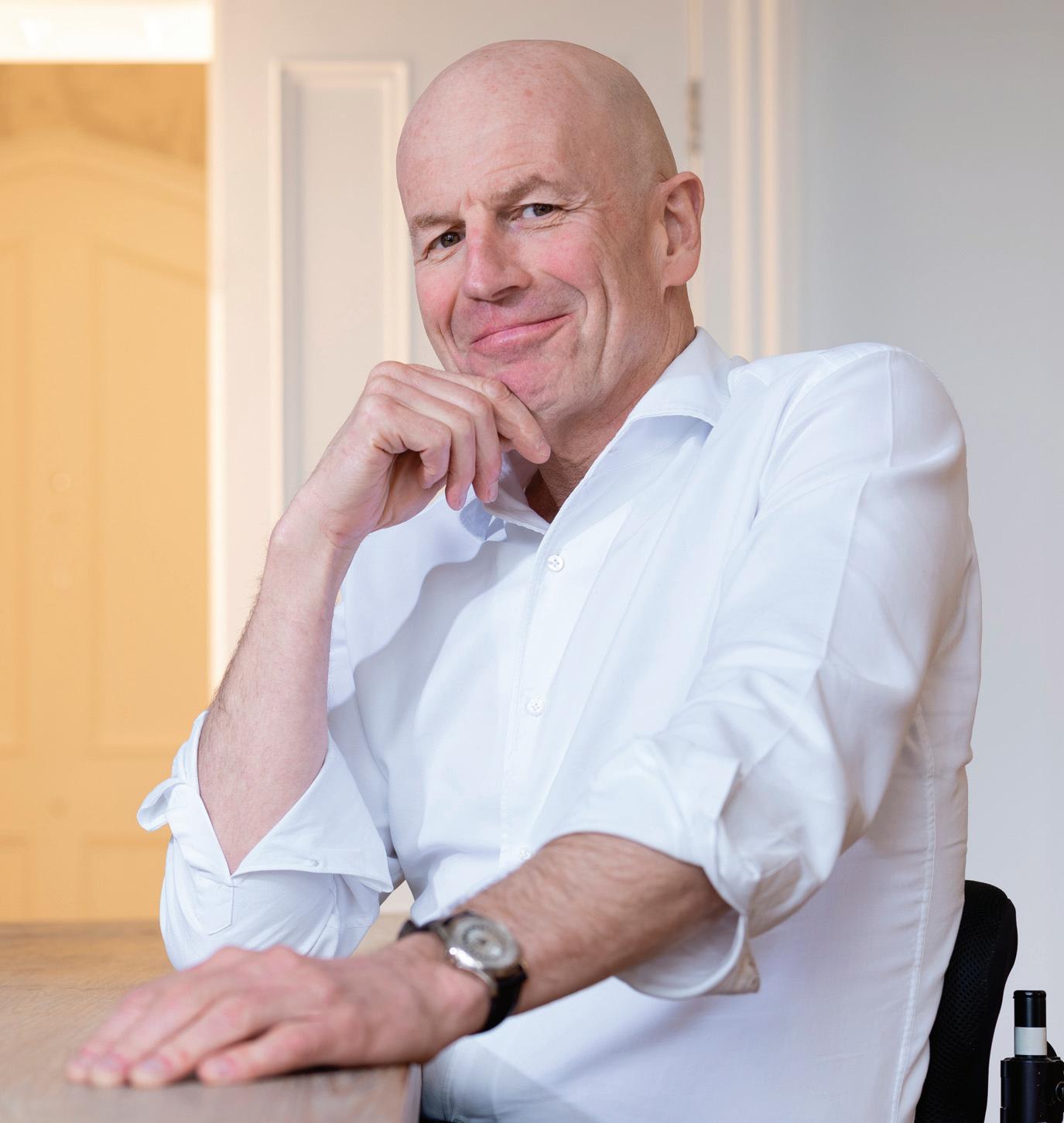
7 minute read
Profile: Steve Ingham


I NG A NEW PAGE



A life-changing skiing accident could have had a devastating effect on PageGroup’s CEO Steve Ingham. DeeDee Doke spoke to him about how life has changed for him – at home and at work
Shortly before Steve Ingham and I are to begin our conversation, our fi rst for a few years, a mighty crash has jolted Ingham’s London house. Th is particular house has recently undergone a lot of renovation, but apparently a piece of the building near the roof has plummeted to ground.
However, everyone in the household, including the dog, is safe. So Ingham is in fi ne humour, crisp and energetic in one of his signature pastel, button-up shirts, open at the top. His offi ce is on the top fl oor of the house, where renovations had begun before the life-changing accident that left him paralysed from the navel down during a birthday skiing trip to Switzerland in March 2019.
When the accident happened, the CEO of PageGroup and his fi ancée were living in a rented third-fl oor fl at with no lift. But they had already purchased this house, and the builders were in. “It needed a lot of work, the roof was off and scaff olding was all over it. I mean, it looked like it was being held up by scaff olding,” he recalls.
“And then I had the accident,” he says. “So, I rang them from intensive care, and said, ‘Stop’. Th ey went, ‘Why?’ and I explained. I said, ‘I just need to know that whatever you’re doing, from now on, isn’t going to have to be redone, because I need a wider door, and I will need this, or I need that because of my disability. At the moment, I don’t know all the answers because what I learn over the next few months will give me those answers – but you know, I don’t know whether I will want to change the design of the house’.
“Obviously,” Ingham continues, “lifts were going to have to come into play, and you have to get planning permission if you’ve got a house of this age. So we had to work out whether, architecturally, there was a route for a lift to be able to go up and down the building so I could access every fl oor.
“So,” he says with some understatement, “there was a lot going on.”
Living life
Flashback to March 2019, when in addition to completing expensive renovations on the newly purchased house in London’s St John’s Wood, Ingham was looking ahead to his daughter’s wedding in
Steve Ingham’s office is on the top floor of his newly renovated house

late summer and attending the 2019 Rugby World Cup in Japan in the autumn, along with his usual fast-paced activity at the global PageGroup business.
But as John Lennon once said, ‘Life is what happens when you’re making other plans.’
On 10 March, during his Swiss holiday, Ingham was skiing alone – “unusually and against everybody’s advice”, he says – when he lost control on a tight corner, fell down a rocky chasm and landed in an icy stream. Even in those initial moments, he knew he was paralysed: “Actually, I had far bigger issues that could have killed me then – one of them was hypothermia because you’re lying in a river, right, and it’s Switzerland, so you’re pretty cold.
“What I didn’t appreciate was I’d also smashed a whole bunch of ribs that had gone into my lungs, so my lungs were fi lling up with blood. I had a litre and a half of blood when I got to the hospital, which they had to drain out because I couldn’t breathe properly,” Ingham says.
“I knew I was in a lot of pain. I knew about the hypothermia, and I knew I was paralysed because I couldn’t feel my legs – I could feel how cold the river was, but my legs couldn’t.
“So straight away, while I was lying in the river, stream, whatever, I was thinking to myself: ‘Well, I’m going to have to be in a wheelchair.’ You know it’s a diff erent kind of physical challenge. Ok, I can deal with that,” he says. “But I need to get out of this bloody river because I will die soon from hypothermia.”
He fought hard to stay awake as the icy water ran through his gloves and other clothing. “I’m not medical, but I knew that I didn’t have long, and I also knew that if I took a rest or if I closed my eyes, that was it. It was a one-way street, you’re gone,” he relates. “And there is an overwhelming desire to go to sleep. It’s an unbelievably powerful feeling, and if you get into it, you’re dead. It’s as simple as that.”
Ingham estimates that about 35 minutes passed before he was spotted. His calls for help and throwing nearby objects into the air such as gloves and ski poles attracted the attention of a passing Frenchman who stopped for a brief respite at the top of the chasm. Th e Frenchman alerted emergency authorities, along with Ingham’s fi ancée, who was waiting for him at

From the start, Ingham knew he was paralysed



their appointed lunch spot. A Swiss mountain rescue team eventually arrived, then a helicopter to ferry Ingham to hospital.
“I remember the doctor climbing down, and I just said, ‘Look, can you give me something for the pain?’ He said, ‘No problem.’ Th en I went into a coma. And I didn’t wake for three days, probably because they made sure I didn’t.”
A terse message from PageGroup notifi ed the City that Ingham had been involved in a serious skiing accident. PageGroup CFO Kelvin Stagg managed the business in Ingham’s absence while Ingham’s treatment for his spinal injury, recovery and rehabilitation took place at hospitals in Switzerland and the UK.
With metal on his ribs and metal on his back and undergoing operations, he was now beginning the process of learning how he needed to live his new life. “Th e limit of what I knew was I’d probably be in a wheelchair, but I had no comprehension of what it actually means,” he acknowledges. “You fi nd out all the complications, all the diffi culties, all the challenges which, you know, you don’t actually learn about until a month, two months, three months, four months, whatever. It’s more of a gradual process so that you know, look, I’m paralysed.
“You know what works, what doesn’t work,” he says. In his case, everything above his waist, he says, “works 100%”. But below his navel, “you know, it’s mixed”.

Living life differently
He is candid about how he must exert planning and control over body functions diff erently than before his injury. And he also talks about the follow-on complications that struck, such as heterotopic ossifi cation or the abnormal growth of bone in the non-skeletal tissues including muscle, tendons or other soft tissue that led to more surgery, more pain and more down time than he wanted.
Physically active before his accident and a rugby player in his youth, Ingham was not able to train for some months, even after returning to work at PageGroup. However, he works with a personal trainer three times a week on Zoom, as well as enjoying visits from his former hospital physiotherapists for two hours a week to help him “do stuff that’s very specifi c to the muscles I need to do stuff to”.
For his home, he’s invested in a stationary bicycle that can exercise his paralysed legs through functional electrical stimulation, and his workout to keep his legs strong and muscular is ‘cycling’ 15km uphill. It’s working, he says.
So, he jokes, “one of the demands of being disabled is that I have to fi t all of these hours into my normal life, which is, in my case, working and family. You have to be quite disciplined now to deal with that”. But staying fi ghting fi t, as Ingham has always aimed for, also
He still aims to stay fighting fit and disciplined



